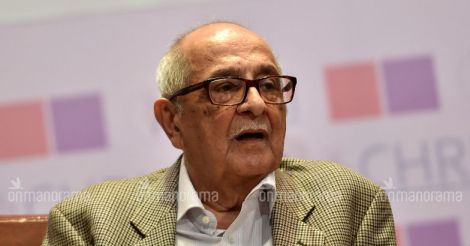New Delhi: The Supreme Court's historic verdict on the decades-old dispute on Cauvery river water sharing between the southern riparian states of Karnataka and Tamil Nadu also saw some heated and anxious moments during its hearing.
On September 30, 2016, jurist and senior advocate Fali S Nariman, who led the arguments for Karnataka, had refused to argue the matter over differences with the state government for its non-compliance of the top court's order asking it to release 6,000 cusecs of water from the Cauvery river to Tamil Nadu. The episode was also mentioned in the court's 465-page verdict penned for the bench by chief justice Dipak Misra.
The court had on February 16 ruled an increase in the share of Cauvery water for Karnataka. The bench, however, did not go into the episode in any detail. The bench, which also comprised justices Amitava Roy and A M Khanwilkar, had appreciated the stand taken by Nariman on the issue, and said, "We think it necessary to state here that Mr Nariman had courageously lived up to the highest tradition of the Bar and we had recorded our uninhibited accession." When the matter was taken up for hearing on September 30, 2016, Nariman had submitted two letters to the top court requesting it to take them on record.
The letters pertained to the communication between him and the state government on compliance of the top court's order for releasing water to Tamil Nadu. During the hearing, Nariman had told the bench that Karnataka chief minister Siddaramaiah had called an all-party meeting after the Supreme Court passed its order on September 27. He had said the meeting reiterated that the "will of the people of the state should be respected" and no water could be released at that juncture. While referring to the contents of his letter to the chief minister, Nariman had told the bench he had unequivocally stated he would not argue for Karnataka till the orders of Supreme Court were followed. He had said he would not make any submission on behalf of Karnataka, a move which was hailed by the bench which said Nariman's stand "unhesitatingly beholds the right tradition of the bar".
The top court after the highly charged hearing had given the last opportunity to the Siddaramaiah government to release 6,000 cusecs of water to Tamil Nadu from October 1 to October 6, 2016, despite a unanimous resolution passed by both house of the Assembly. "Karnataka, despite being a state, is flouting the order and creating a situation when the majesty of the law is dented," it had said. The top court had then ordered all the stakeholders - Karnataka, Tamil Nadu, Kerala and Puducherry - to suggest names of representatives to be included in the Cauvery Water Management Board, which would be chaired by the union water resources minister.
Similarly, another incident annoyed the apex court during the hearing on September 12, 2016, when Karnataka moved an application for modification of the September 5, 2016, order directing it to release water to Tamil Nadu. Karnataka had sought a modification of the order on the grounds that spontaneous agitations had broken out in various parts of the state, which had paralyzed normal life and resulted in the destruction of public and private properties worth hundreds of crores of rupees. The top court after reading the affidavit filed by Karnataka observed the application contained "certain averments which cannot be conceived of to be filed in a court of law seeking modification of an earlier order".
It categorically stated that an "agitation in spontaneity or propelled by some motivation or galvanized by any kind of catalystic component can never form the foundation for seeking a modification of an order".
"Citizens cannot become the law unto themselves; and when a court of law passes an order, it is the sacred duty of citizens to obey the same," the bench had said while rejecting the prayer of the state government to keep the order in abeyance but had modified the order for the release of water.
Read: Latest India News

























